|
|
|
Sort Order |
|
|
|
Items / Page
|
|
|
|
|
|
|
| Srl | Item |
| 1 |
ID:
132412
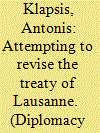

|
|
|
|
|
| Publication |
2014.
|
| Summary/Abstract |
In June 1925, General Theodoros Pangalos imposed his dictatorship on Greece. During his 14-month rule, he set as one of his basic foreign policy goals the revision of the territorial settlement imposed on Greece and Turkey by the 1923 Treaty of Lausanne. Wanting to secure Eastern Thrace and possibly even part of Western Asia Minor for Greece, Pangalos sought the backing of at least one Great Power with interests in the region, in this case Italy, as its dictator, Benito Mussolini, remained equally hostile and aggressive toward Turkey. Pangalos tried to reach an understanding with Mussolini concerning the possibility of joint Greco-Italian action against Turkey. The first signs of closer co-operation came in early July 1925 when the Italian under-secretary of foreign affairs, Dino Grandi, visited Athens for discussions with Pangalos. However, a more important initiative involved the official visit of two Greek ministers-Loukas Kanakaris-Roufos, the foreign minister, and Anastasios Tavoularis, the transport minister-to Rome in early March 1926. They met with Mussolini who, because of British pressure, now seemed reluctant about Pangalos' ambitious plans for joint action against Turkey. The Greek leader's hopes to revise Lausanne ended.
|
|
|
|
|
|
|
|
|
|
|
|
|
|
|
|
| 2 |
ID:
116010
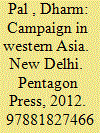

|
|
|
|
|
| Publication |
New Delhi, Pentagon Press, 2012.
|
| Description |
xxiii,570p.
|
| Contents |
Official History of Indian Armed Forces in the Second World War 1939 - 45
|
| Standard Number |
9788182746633
|
|
|
|
|
|
|
|
|
|
|
|
Copies: C:1/I:0,R:1,Q:0
Circulation
| Accession# | Call# | Current Location | Status | Policy | Location |
| 056954 | 355.0094/PAL 056954 | Main | On Shelf | Reference books | |
|
|
|
|
| 3 |
ID:
043437
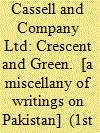

|
|
|
|
|
| Edition |
1st ed.
|
| Publication |
London, Cassell, 1955.
|
| Description |
x, 170p.hbk
|
|
|
|
|
|
|
|
|
|
|
|
Copies: C:1/I:0,R:0,Q:0
Circulation
| Accession# | Call# | Current Location | Status | Policy | Location |
| 013458 | 954.91/CAS 013458 | Main | On Shelf | General | |
|
|
|
|
| 4 |
ID:
135063
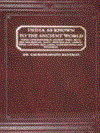

|
|
|
|
|
| Publication |
New Delhi, Asian Educational Service, 2006.
|
| Description |
73p.Hbk
|
| Contents |
Old Publication
|
| Standard Number |
8120605616
|
|
|
|
|
|
|
|
|
|
|
|
Copies: C:1/I:0,R:0,Q:0
Circulation
| Accession# | Call# | Current Location | Status | Policy | Location |
| 057974 | 934/BAN 057974 | Main | On Shelf | General | |
|
|
|
|
| 5 |
ID:
127051
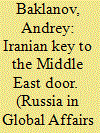

|
|
|
|
|
| Publication |
2013.
|
| Summary/Abstract |
The election of Hassan Rouhani as Iran's president attracted everyone's attention with the inaugural ceremony attended by officials from more than 50 countries. The event gave rise to numerous propositions about a possible progress in the regime and in Tehran's future relations with the rest of the world. The prevailing perception is that the victory of a moderate and pragmatic candidate gives hope for a more fruitful dialogue which may facilitate the solution of numerous persisting problems. There is a good deal of reasoning in the propositions, yet deep-seated stereotype thinking still prevails. The assessments definitely need serious correction if we do not want to miss the opening opportunities - once again. In a situation of rigid Western economic sanctions and complicated relations with practically all of its neighbors, Iran nevertheless is turning into a most important state in a vast geopolitical area that embraces the Middle and Near East, Central and Western Asia. The Iranian aspect is present in practically all international problems that draw global attention, such as nuclear nonproliferation, the Middle East peace process, the legal status of the Caspian Sea, Central Asia, etc. Tehran is an active participant in the dialogue of civilizations and, naturally, remains one of the key players on the hydrocarbon market. To a large extent, Iran's role has been enhanced by the difficulties brought about by the Arab Spring in other major countries in the region, including Egypt - Iran's traditional competitor - which is sinking into the quagmire of internal political confrontation. Prior to the presidential election I happened to visit Iran and talk with some leading politicians and clerics about the situation in the country, their perception of the Iranian nuclear program and other issues that link Iran with other countries in the region and major world powers. Given the role played by the religious factor, it was particularly interesting to hear the opinions of religious leaders when visiting the holy Shi'ite city of Qom.
|
|
|
|
|
|
|
|
|
|
|
|
|
|
|
|
| 6 |
ID:
124852
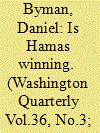

|
|
|
|
|
| Publication |
2013.
|
| Summary/Abstract |
Israel, the United States, and the international community must recognize the ugly truth: Hamas is winning, and it may be too late to reverse this trend. The current drift in policy should be replaced by coercing and incentivizing Hamas to renounce violence.
Hamas members are ''ants,'' declared Yasser Arafat, the father and long-/time leader of the Palestinian national movement, during a private speech in 1990. Its cadre, he went on, should cower in their holes lest they be crushed by Arafat's Fatah forces.1 Arafat's swagger seemed justified. Fatah had ruled the roost for decades, and after Hamas emerged in December 1987 as the first intifada erupted, the Islamist organization was on the ropes. After a few unimpressive attacks, Israel had quickly arrested over 1,000 Hamas members, including its top leadership.2 In 1989, less than three percent of Palestinians in Gaza, where Hamas would later prove strongest, supported the organization.3 Journalist Zaki Chehab claimed Hamas' military wing only had twenty machine guns as the intifada wound down.4 Fatah, it seemed, would remain the dominant
force in the Palestinian National Movement.
|
|
|
|
|
|
|
|
|
|
|
|
|
|
|
|
| 7 |
ID:
124783
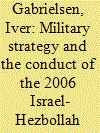

|
|
|
|
|
| Publication |
2013.
|
| Summary/Abstract |
This article examines the military strategies employed during the 2006 Israel-Hezbollah War and assesses the political war aims based on the outcome of the war. The assessment argues that the Israeli Defence Forces (IDF)'s strategy could not realistically attain Israel's strategic aims because the IDF struggled to translate tactical successes into strategic gains. Hezbollah's strategy more effectively matched the war's conduct and enabled it to attain more, albeit limited, war aims.
|
|
|
|
|
|
|
|
|
|
|
|
|
|
|
|
| 8 |
ID:
120869
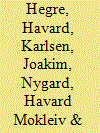

|
|
|
|
|
| Publication |
2013.
|
| Summary/Abstract |
The article predicts changes in global and regional incidences of armed conflict for the 2010-2050 period. The predictions are based on a dynamic multinomial logit model estimation on a 1970-2009 cross-sectional data set of changes between no armed conflict, minor conflict, and major conflict. Core exogenous predictors are population size, infant mortality rates, demographic composition, education levels, oil dependence, ethnic cleavages, and neighborhood characteristics. Predictions are obtained through simulating the behavior of the conflict variable implied by the estimates from this model. We use projections for the 2011-2050 period for the predictors from the UN World Population Prospects and the International Institute for Applied Systems Analysis. We treat conflicts, recent conflict history, and neighboring conflicts as endogenous variables. Out-of-sample validation of predictions for 2007-2009 (based on estimates for the 1970-2000 period) indicates that the model predicts well, with an area under the receiver operator curve of 0.937. Using a p > .30 threshold for positive prediction, the true positive rate 7-9 years into the future is 0.79 and the False Positive Rate 0.085. We predict a continued decline in the proportion of the world's countries that have internal armed conflict, from about 15% in 2009 to 7% in 2050. The decline is particularly strong in the Western Asia and North Africa region and less clear in Africa south of Sahara. The remaining conflict countries will increasingly be concentrated in East, Central, and Southern Africa and in East and South Asia.
|
|
|
|
|
|
|
|
|
|
|
|
|
|
|
|
| 9 |
ID:
126470
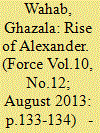

|
|
|
|
|
| Publication |
2012.
|
| Summary/Abstract |
In our last episode we saw Alexander succeed Philip II as king of Macedonia. In this episode we will trail him on his campaign against the Persians, then the largest empire on earth
From his first regnal year till he breathed his last, Alexander unleashed an unrelenting spate of campaigns that would see him overrun all Asia till the doors of India. His conquests included, from west to east, the Balkans (former Yugoslavia), Anatolia (Turkey), Egypt, Gaza, Phoenicia (Lebanon), Judea (Israel and Jordan), the Levant (Syria), Mesopotamia and Babylonia (Iraq), Persia (Iran) and Bactria (Afghanistan). His empire extended as far as the Hindukush mountains.
|
|
|
|
|
|
|
|
|
|
|
|
|
|
|
|
| 10 |
ID:
128122
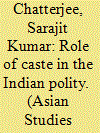

|
|
|
|
|
| Publication |
2013.
|
| Summary/Abstract |
It is perhaps true that the most frequently mentioned peculiarity of the traditional Hindu Society is the institution of caste, or as it is more frequently called, the caste system. Social institutions that resemble caste in one respect or the other are not difficult to find elsewhere, but it is only in India that it is know as 'caste'.
|
|
|
|
|
|
|
|
|
|
|
|
|
|
|
|
| 11 |
ID:
122981
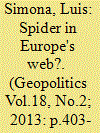

|
|
|
|
|
| Publication |
2013.
|
| Summary/Abstract |
This article examines the relationship between geopolitical change and the evolution of French grand strategy from Iraq to Libya. While the European Union (EU) and the bilateral relationship with Germany continue to feature high in French grand strategy, France has in the space of just a few years substantially strengthened its Atlantic connection (with the US, Britain and NATO) and upgraded its relationship with other European powers - particularly Russia. It is argued that the driving reason behind this diversifying trend is the weakening of the US-led West, both globally and in Europe. If US military power laid the foundations of order in and around Europe, America's shift of geostrategic attention eastwards is underpinning a political destructuring of Europe and its broader neighbourhood. For one thing, Europe is moving towards a more multipolar balance, as evidenced by Russia's resurgence in the east and southeast, Turkey's drifting from the EU and growing influence in the continent's southeast and, crucially, Germany's increasing influence over the direction of the EU. For another, France's so-called axis of strategic priority (Northern Africa, the Sahel, Levant, Horn of Africa/Red Sea and the Gulf) is characterised by mounting instability and increasing penetration by external powers. Against this backdrop, the special relationship with Germany and the EU are insufficient to guarantee French influence in Europe, the stability of Europe's broader neighbourhood or France's aspirations to global power. In an increasingly uncertain global and regional environment, France is seeking to reconcile a deeper politico-military relationship with Britain (and the United States), a special relationship with Germany in the politico-economic sphere and strong ties with Russia, thereby positioning itself as a sort of spider in an increasingly multipolar European geopolitical web.
|
|
|
|
|
|
|
|
|
|
|
|
|
|
|
|
|
|
|
|
|